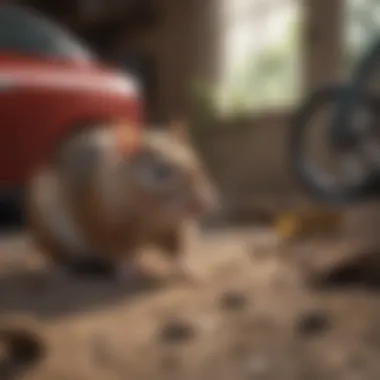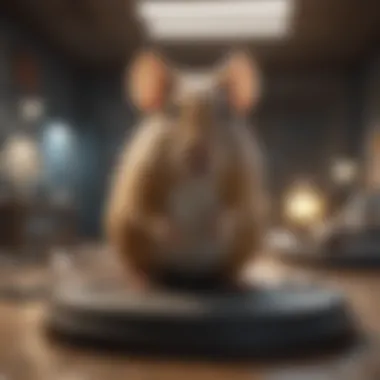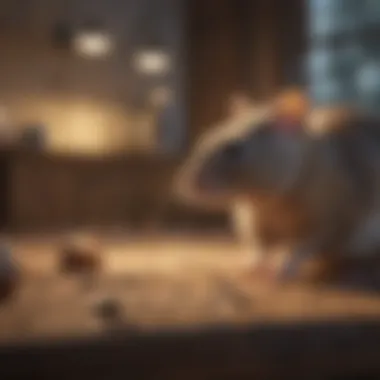Understanding Progressive Insurance for Rodent Damage


Intro
Insurance policies can often feel like a complicated maze. Many people focus on the obvious aspects, such as coverage for fire or theft, but they often overlook specific types of damage, like that caused by rodents. This article aims to clarify the nuances of Progressive Insurance's approach to rodent damage coverage. Understanding this aspect can significantly influence how homeowners can shield themselves against less common but potentially costly incidents.
In the following sections, we will explore definitions and key terms of rodent damage, delve into the claims process, and address common misconceptions surrounding this topic. By the end, readers should be more informed about what to expect from their policies and how to navigate their insurance decisions more effectively.
Overview of the Financial Topic
Definition and Importance
Rodent damage refers to any harm inflicted on property by rodents such as rats, mice, or squirrels. This damage can lead to structural issues, electrical problems, and even health hazards due to contamination. It is vital to understand how insurance policies, particularly those by Progressive, categorize rodent damage, as this will determine what is covered and what is not.
Key Terms and Concepts
Here are a few essential terms to familiarize yourself with:
- Exclusions: Things that are not covered by an insurance policy.
- Deductible: The amount policyholders pay out of pocket before insurance kicks in.
- Liability Coverage: This covers damages to others that might occur due to an incident in your home.
- Claim: A request made to an insurance company for payment due to loss or damage.
Understanding these terms sets the groundwork for navigating your insurance policy effectively and knowing what to expect when filing a claim for rodent damage.
Exhaustive Analysis of Financial Products
Types of Financial Products Available
Progressive offers several home insurance products that may include rodent damage coverage. Homeowners should look for:
- Dwelling Protection: Protects the structure of the home.
- Personal Property Coverage: Covers personal belongings damaged by rodents.
Pros and Cons of Each Option
- Dwelling Protection:
- Personal Property Coverage:
- Pros: Comprehensive coverage for structural damage.
- Cons: It does not usually cover damages due to unchecked infestations.
- Pros: Important for covering damaged furniture and appliances.
- Cons: May require additional riders for full rodent coverage.
Market Trends and Insights
Recent studies indicate a rise in claims related to rodent damage as urban areas grow denser. This trend underlines the necessity of understanding policy details. One should not overlook that many homeowners fail to recognize exclusions, causing unexpected financial burdens during incidents.
Comparison and Evaluation
Comparison Charts or Tables
When evaluating Progressive insurance products, consider the claims process, customer service, and overall satisfaction.
Case Studies or Examples
In some instances, a homeowner filed a claim for rodent damage only to realize they didn't fully understand their coverage limitations, which resulted in unexpected costs. These cases highlight the necessity for thorough knowledge of policy details.
User Experiences and Feedback
Reviews from users of Progressive reflect a mixed bag of experiences. While many find their service satisfactory, there are complaints about the clarity in policy documents.
Expert Recommendations
Tips from Financial Advisors


- Read your policy thoroughly.
- Consider additional coverage options if you live in a high-risk area for rodent infestations.
Best Practices for Selecting Financial Products
- Compare quotes from different providers.
- Focus on the details of the policy rather than the premiums alone.
Suggested Frequently Asked Questions (Help Sections)
- Is rodent damage covered in standard policies?
- What should I do if I suspect rodent damage?
- Not always. Often, it might be considered an exclusion.
- Contact your insurer immediately and document any damage.
Steps Toward Implementation
Practical Steps for Users to Take
- Review and understand your current policy.
- Assess your home for potential rodent entry points.
- Document any past rodent-related incidents.
Tools and Resources for Assistance
Progressive offers online tools that can assist policyholders in understanding their coverage better. Adjusting coverage options online can often be more efficient.
Important Considerations and Warnings
- Always keep thorough records of your claims process to avoid issues later on.
Foreword to Progressive Insurance
Insurance is essential for safeguarding one’s financial well-being. Understanding different aspects of an insurance company is crucial. This section focuses on Progressive Insurance, a major player in the insurance industry. It is important to comprehend what Progressive offers. This forms the foundation for understanding specific coverage like rodent damage. Exploring Progressive’s approach can help policyholders make informed choices.
Overview of Progressive Insurance
Progressive Insurance was founded in 1937. Over the decades, it has become known for its innovative policies and services. Its unique name originated from its focus on providing contemporary insurance solutions. Progressive is recognized for its competitive rates and various coverage options. They strive to simplify the insurance process, making it more accessible for customers.
The company offers numerous products beyond basic auto insurance. These include homeowners, renters, and commercial insurance. This diversification speaks to its commitment to meet varied needs. As one of the largest auto insurers in the United States, Progressive also emphasizes technology. Its online tools allow customers to manage their policies easily, representing a notable shift in the insurance landscape.
Types of Coverage Offered
Progressive’s insurance offerings can be categorized into several key areas:
- Auto Insurance: Most recognized for this coverage, which includes liability, collision, and comprehensive options.
- Homeowners Insurance: This protects homes against various risks, including damages and loss.
- Renters Insurance: It covers personal property for tenants, addressing needs similar to homeowners.
- Condo Insurance: Designed for condominium owners, it covers personal property and liability.
- Motorcycle Insurance: Specifically tailored for motorcycle owners, offering similar protections as auto insurance.
- Boat Insurance: Protects recreational watercraft from various risks, crucial for boat owners.
- Commercial Insurance: Provides coverage for businesses, addressing unique liabilities and risks.
Understanding these types of coverage is vital, especially when exploring specifics such as rodent damage. The relevance of each category cannot be understated, as they serve as the framework for what users can expect. The comprehensive nature of Progressive’s offerings enables diverse customer needs to be met efficiently.
Understanding Rodent Damage in Insurance Terms
Understanding rodent damage in the context of insurance is key for homeowners and policyholders. This section aims to clarify what constitutes rodent damage and its implications for insurance coverage. Rodent damage can have significant impacts on property value and safety. Thus, grasping how this is classified and handled by insurance policies is vital.
Definition of Rodent Damage
Rodent damage refers to any harm caused by rodents such as mice, rats, or squirrels in a residential setting. This type of damage can include chewed wiring, contaminated insulation, and holes in walls or floors. It does not necessarily have to be a result of direct action by rodents. For instance, a rodent infestation can lead to the deterioration of materials in a home over time. Understanding this definition helps in identifying what may be covered under an insurance policy.
Moreover, the classification of rodent damage can sometimes result in confusion for the policyholders. Terms like pest or vermin damage can often be used interchangeably but may not have the same implications in an insurance context. Familiarizing oneself with these terms helps in navigating the complexities of filing claims and choosing appropriate coverage.
Common Causes and Manifestations


Several factors can lead to rodent infestations. Poor sanitation practices, clutter, and easy access points into the home, such as gaps around utilities and poor sealing of doors and windows, can all contribute to attracting rodents. In urban areas, the problem can be exacerbated by close proximity to other buildings, which may serve as nesting sites or food sources.
Common manifestations of rodent damage can include:
- Chewed wires, which pose fire hazards.
- Holes in walls or floors, affecting the structure's integrity.
- Droppings and urine contaminants, leading to health risks.
- Gnawed insulation, which can decrease energy efficiency and escalate heating costs.
Recognizing these signs early is important for homeowners. Addressing rodent damage swiftly can contain the issue before it necessitates extensive repairs. Additionally, knowing how these factors interrelate can lead to more informed discussions with insurance providers about relevant coverage options.
Does Progressive Cover Rodent Damage?
The question of whether Progressive Insurance covers rodent damage is crucial for many homeowners. Given the prevalence of rodent infestations, understanding the nuances of your insurance policy can save you from unexpected expenses. Rodent damage can manifest in various ways, such as chewed wires, structural damage, or contamination of food supplies. Knowing if and how this kind of damage is covered helps policyholders to make informed decisions.
Evaluating the Policy Language
When examining your Progressive Insurance policy, it is important to scrutinize the language used regarding coverage for rodent damage. Insurance policies can often be quite complex, filled with legal jargon and specific terms that may not be immediately clear. Key phrases such as "specific perils" or "exclusions" will provide insight into whether your rodent-related damage is covered.
To determine coverage:
- Read the policy document thoroughly. This includes both the declaration page and the policy provisions.
- Look for sections on dwelling coverage and personal property coverage since rodent damage may fall under these categories.
- Identify language about exclusions. If rodent damage is mentioned as an excluded risk, it indicates that you would not be compensated for such damage under your current policy.
Using clear and precise language in the policy is crucial. Sometimes, common misunderstandings can arise over vague terms. If you are unsure about any aspect, it is advisable to reach out to a Progressive representative for clarification.
Specific Exclusions and Limitations
Understanding the specific exclusions and limitations in your insurance policy is pivotal. For Progressive, like many other insurers, rodent damage may not be covered under standard homeowners' policies. Here are some important exclusions to consider:
- Gradual damage claims: If rodent damage is viewed as a result of neglect or poor maintenance, it may not be reimbursed.
- Infestations: Some policies specifically exclude damages caused by vermin, including rodents.
- Consequential damages: If rodent activity leads to other types of damage, such as fire due to chewed wires, coverage may be limited.
"It is essential to recognize these exclusions while purchasing insurance. Understanding them helps in mitigating risks associated with rodent damage."
These exclusions vary significantly among policies. Evaluation of your specific coverage is necessary to understand whether you face potential uncovered losses.
How to File a Claim for Rodent Damage
Filing a claim for rodent damage with Progressive Insurance can seem daunting. It is crucial to understand the process to ensure you receive the coverage you need. Properly filing your claim can make a significant difference in how quickly and efficiently it is processed. Addressing rodent damage promptly can also prevent further harm to your property and assist in better managing potential costs associated with repairs.
Initial Steps for Claim Submission
The first move in filing a claim is to notify Progressive Insurance. You can do this by calling their claims department or using their online claims portal. Prepare for the initial conversation. Have your policy number ready, along with details about the damage. Consider the following points during your communication:
- Be Precise: Clearly describe the extent of the damage. Specificity aids in understanding.
- Time Matters: Report the damage as soon as possible. Delaying can complicate the claims process and may impact coverage.
- Contact Info: Ensure you provide updated contact information so that an adjuster can reach you.
Documentation Requirements
Documentation is essential to support your claim. Progressive will require evidence of the damage and the circumstances surrounding it. Here are key documentation components:
- Photos: Capture clear images that depict the damage from various angles. This evidence can be a crucial part of the claim.
- Written Estimate: If possible, obtain a written estimate from a repair service. This estimate can provide insight into the financial implications of the repairs.
- Incident Report: Create a brief report detailing when and how the damage occurred. Include any relevant observations or findings.
- Policy Information: Have a copy of your insurance policy handy. It can assist in guiding the conversation with your claims adjuster.
Timeline for Claim Processing
Understanding the claims processing timeline is vital. Once you file, Progressive will assign an adjuster to evaluate the damage.
- Initial Review: The adjuster typically reviews all submitted documents and photographs soon after the claim is filed.
- Field Inspection: An on-site inspection may occur. Be prepared for the adjuster to examine the damage firsthand.
- Decision Notification: Progressive usually communicates their decision within a few weeks, but complexities can arise that may extend this period.
It is beneficial to maintain open communication with your adjuster. They can provide updates and additional information and guide you through the process.
By understanding each aspect of filing your claim, you can enhance the possibility of a smooth and efficient resolution. Knowledge about required steps and documentation will empower you significantly in dealing with rodent damage claims.


Preventive Measures Against Rodent Infestations
Effective control of rodent infestations begins long before a damage claim is considered. Understanding and implementing preventive measures is crucial. Not only do these approaches mitigate potential financial losses, but they also promote a healthier living environment. Rodents can cause significant damage, such as gnawing on wires or contaminating food supplies. Thus, diligence in preventing these issues can save homeowners from long-term stress and unexpected costs.
Home Maintenance Tips
Regular home maintenance plays a vital role in keeping rodents at bay. Several practical tips can be easily integrated into routine chores:
- Seal Entry Points: Identify and close any holes or cracks in walls, foundations, and utility entry points. Rodents can squeeze through surprisingly small openings.
- Store Food Properly: All food should be securely stored in metal or glass containers. This minimizes access to potential food sources.
- Keep Clutter to a Minimum: Clutter provides harborage for rodents. Declutter your home and yard to reduce potential nesting sites.
- Maintain Cleanliness: Regular cleaning of areas such as kitchens and garages reduces food particles that might attract rodents.
Consistent application of these maintenance habits creates an environment less hospitable for these pests. Homeowners should routinely check for new issues and address them promptly.
Choosing Professional Pest Control Services
Sometimes, preventive measures may not be sufficient. In such cases, it becomes necessary to engage professional pest control services. This choice brings several advantages:
- Expertise: Trained professionals possess the knowledge to identify signs of rodent presence and the best removal methods.
- Customized Solutions: Pest control services offer tailored plans that address specific rodent issues based on the home's unique situation.
- Ongoing Prevention: Many pest control companies offer maintenance contracts for continued protection. This approach ensures that any new infestations are dealt with swiftly, keeping the home secure.
When selecting a pest control company, it's essential to evaluate their reputation, experience, and customer reviews. Look for certifications or affiliations with respected pest management organizations to ensure quality service.
Preventive measures are the first line of defense. Ignoring them can lead to more complex problems that require extensive solutions.
Alternatives to Progressive for Rodent Damage Coverage
Exploring alternatives to Progressive for rodent damage coverage is essential for homeowners who seek comprehensive protection and peace of mind. Understanding that Progressive might not be the ideal fit for everyone is crucial. Various factors such as coverage limits, policy exclusions, and overall customer service should be considered when evaluating different insurance providers. The implications of choosing a provider that aligns with one’s specific needs will play a significant role in safeguarding your property.
Other Insurance Providers
There are several insurance providers that offer coverage for rodent damage. Notably, companies such as Allstate, State Farm, and Farmers Insurance provide different approaches to homeowners' insurance. These companies often include pest damage under their policies, though it is essential to read the fine print. Each company has varying approaches to what types of rodent damage are covered. For instance:
- Allstate: This provider offers comprehensive plans covering various types of damage, including some pest-related issues, depending on the policy chosen.
- State Farm: Known for customizable policies, it allows policyholders to add endorsements tailored to specific needs, possibly including pest infestations.
- Farmers Insurance: This company may include rodent damage under standard coverage, though it is vital to confirm specific details with a representative.
When researching other providers, check their financial stability and customer reviews. These aspects can indicate reliability and service quality.
Evaluation of Coverage Options
Evaluating coverage options is a vital step in the insurance decision-making process. Here are some considerations to keep in mind when assessing alternatives:
- Policy Specifications: Understand what is explicitly covered against rodent damage. Many companies outline clear distinctions between covered risks and exclusions.
- Limits and Deductibles: Each policy will have its own deductibles and coverage limits. It’s important to know what you would have to pay out of pocket before coverage kicks in.
- Endorsements and Riders: Additional coverage can often be purchased as an endorsement or rider. This can enhance coverage to include risks not covered by standard policies.
- Customer Support and Claims Process: The quality of customer service can greatly affect your experience. Research how easy it is to file claims and how efficiently issues are resolved.
- Cost Consideration: Different providers will have varying premium prices based on their coverage, so weigh the cost against potential benefits.
End
Exploring alternatives to Progressive for rodent damage coverage can yield better options tailored to your specific situation. By researching other insurance providers, evaluating their offerings, and understanding your own home’s needs, you can make more informed decisions. This step ensures adequate coverage and protects your investment against unforeseen damages.
Final Thoughts on Insurance and Rodent Damage
In the realm of insurance, understanding coverage details is paramount, especially regarding niche issues like rodent damage. This section serves to tie together the critical insights presented throughout the article, focusing on the importance of being well-informed about your insurance policy.
Importance of Understanding Your Policy
A thorough comprehension of your policy ensures you are aware of what is covered and what is not. Insurance documents can be complex and are often filled with terminology that may confuse the average policyholder. Ignoring these details can lead to unexpected out-of-pocket expenses in case of a claim. Progressive Insurance, like other providers, includes specific language about rodent damage within its policies. Knowing the extent of your coverage allows you to mitigate risks and prepare adequately.
- Review your policy regularly to understand coverage limits.
- Pay attention to exclusions, especially regarding rodent infestations.
- Consult with an insurance advisor if unclear on specific terms.
By grasping these elements, policyholders can avoid pitfalls that often accompany misunderstandings of insurance terms. In the event of rodent damage, knowing whether your specific situation is covered could save you significant financial burdens.
Staying Informed and Prepared
Staying informed about changes in insurance policies and industry standards is crucial. Insurance companies, including Progressive, may update their policies regularly. Staying educated ensures that you can adapt to these changes and optimize your coverage. Here are a few considerations for being proactive:
- Regularly review your coverage: Engaging with your insurance provider or checking your policy document ensures you know any updates.
- Explore additional coverage options: If your current plan does not cover certain risks, explore additional endorsements that can enhance your protection against rodent damage.
- Join community discussions: Platforms like Reddit or insurance forums can provide real-life insights on experiences with rodent damage claims, increasing your knowledge base.
Staying abreast of your insurance policy is not merely a prudent practice; it is an essential aspect of personal finance management.







